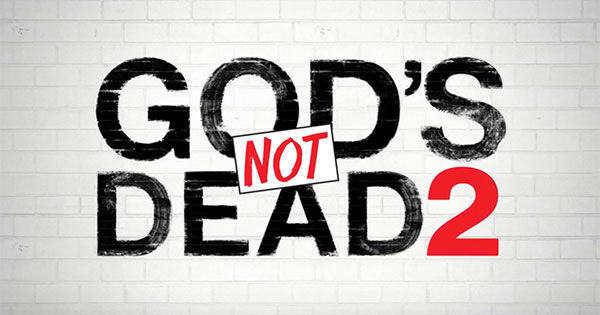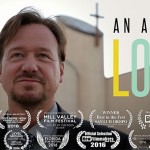
I’ve been avidly consuming any and all speculation and analysis of the trailers for the upcoming “Star Wars: The Force Awakens,” and it struck me that we should do our own scene-by-scene analysis of the latest trailer to drop for another blockbuster sequel. I’m referring, of course, to the no-doubt highly anticipated sequel to 2014’s “God’s Not Dead.”
As I wrote in my review of that horrid film, “God’s Not Dead” was a narrative fantasy of conservative evangelical projection. Non-Christians were bad. Academics and universities were bad. But atheists were especially bad. And good Christians have to rise up to defend their faith when they are confronted with a philosophy professor who seems more interested in science than philosophy (I have to agree there – that would definitely go on my student evaluation).
It’s hard to imagine a story even more divorced from reality than “God’s Not Dead” — hard, that is, until one sees the new trailer for “God’s Not Dead 2”:
https://youtu.be/Fq6lG4GeEMI
First off, what’s with the lame title? Most sequels nowadays don’t just go with numbers. Why not the obvious “God’s Still Not Dead” with maybe an editing caret adding “still”? Or better yet – “God’s Not Deader” or maybe “God’s Not Dead – Not Dead Harder”?
Whatever the title, the sequel appears to be connected to the first film only by way of sharing a (purely) fictional universe. But this time, the hero is a school teacher in a plot so impossible it should really be classed as speculative history.
I’m going to start with what we find out last in the trailer: this film opens on April 1. Seriously. I’m not sure who the marketing supervisor is on the film, but that seems like you’re really just lobbing softballs. I admit that I did a doubletake and had to watch the trailer again. I mean, it was very bad – maybe it was a joke? But no, two of the actors from the first movie are there, and an embarrassing list of celebrity actors who must be short on cash.
While “God’s Not Dead” focused on a hero college student at an evil secular university, its sequel will instead feature a hero teacher at an evil public high school. The set-up for the “controversy” is so untenable as to be absurd. The teacher is giving a lecture on non-violence, and a student asks her if this is similar to Jesus’s teaching. She says yes, quotes a verse of Jesus on pacifism, and then some student texts his parents from class (as a teacher I find that part the most scandalous — he TEXTS in CLASS) to tell on her for talking about Jesus.
But before all this, we get a voiceover: “the most basic human right of all is the right to believe,” says Pat Boone, taking a break from Branson. I like this – freedom of conscience, right? Each person has a right to that. Yet immediately we then get the school principal (played by Robin Givens – yes really!) saying: “no prayers … no moments of silence … nothing.” Now I’m confused. Because students are, in fact, allowed to pray in school the same way they’re afforded all other constitutionally protected rights. Oh, but “moments of silence” sort of gives it away, right? We’re talking about the Christian Right’s long-lamented dismay with the removal of school-sponsored prayer. But I thought we just said each person has a right to believe? That would mean to disbelieve, right? So why would you want a school to lead a prayer? Isn’t it bound to run afoul of someone’s personal “right to believe”? I’m guessing this cognitive dissonance won’t be addressed.
Instead, we move right into Pastor Dave’s remarks. He was the minister in the first movie, and here he informs a room of people that they have to stand by their beliefs, or “the pressure that we feel today, will mean persecution tomorrow. We’re at war.”
So we might as well stop there, right? These movies are predicated on the fact that Christians are being persecuted, and now their main man of the cloth has essentially argued that there’s a war. This is really what’s wrong with these movies – they dehumanize everyone outside of evangelical subculture into bizarre caricatures that are “the enemy,” making it increasingly difficult for members of that subculture to interact with the outside “other” – you know, like Jesus did.
At any rate, we now get the classroom scene described above. Walking with Principal Givens, the teacher is asked if she really did quote Jesus. “If you’re asking if I responded to a student’s question, then yes,” says Melissa Joan Hart, the teacher in this rabbit-hole school. In a disciplinary hearing of some kind, another official-looking guy clarifies: “So you incorporated … the words … of Jesus.” Another woman is then heard saying, “What were you thinking, Grace?” Next her attorney explains to her that the family in question “is asking that you be fired … plus revocation of your teaching certificate.”
If you’re like me when I first watched this, you need a moment to compose yourself. This plot is of course the most laughably absurd nonsense I’ve seen … well, this month, anyway.
Needless to say, teachers aren’t threatened with firing, much less revocation of their licenses, for merely quoting from the New Testament. I know because I have myself, in a public school classroom, quoted from the New Testament when I deemed it helpful within a specific context. Case in point: I recently made my Latin students aware of the very weighty theological debates centering on the Greek phrase pistis Christou in the letters of Paul. Why? Because we had been learning about the objective genitive, a grammatical construction in both Greek and Latin, and this was a case where the grammar of a phrase meant a great deal to none too few people.
When presented in an objective, secular way, teachers are welcome to discuss any number of religious texts, assuming it is relevant to class materials. And while the Alliance Defending Freedom (the group behind these awful films) would no doubt provide anecdotal lists of school offenses on this score, the fact is that a systematic persecution of Christian students and teachers just is not happening, especially along the scope presented in this movie.
And besides, if we want to play the game of anecdote, we could point out the Kansas teacher who actually was asked to resign this week for showing an anti-bullying video in class, or about a teacher in Mississippi who is accused of berating atheist students in his class.
But I digress. Let’s get back to the trailer!
After Ms. Hart is reprimanded, the school apparently turns the case over the American Civil Liberties Union (who else?) to go after her. I don’t think this is what the ACLU does – I don’t think they’re on general retainer for institutions, but that’s just pesky reality. I mean, we had to get them involved somehow. So here we learn who this movie’s villain will be, as Ray Wise manages to fulfill every right-wing stereotype about the ACLU in his mere seconds on the screen: “We’re going to prove once and for all … that God is dead.”
The good Christian lawyer defending Ms. Hart asserts in a courtroom that faith really is on trial here, and I agree – in this alternative reality that bears no resemblance to American jurisprudence, it apparently is. In a bench conference with the judge, Wise remarks, “You’re looking to prove that Jesus Christ existed? That’s ridiculous!” So apparently what started as a bogus trial based on a bogus claim that teachers can’t quote Jesus has now become a de facto trial over his existence. Naturally.
“I hate what people like your client stand for, and what they’re doing to our society,” Wise intones again. Well, now we’re closer to the truth, because like many others, I really do dislike what these filmmakers stand for: distortion, division, tribalism, etc. But of course, that’s not how we’re supposed to see Wise: no, he’s an archetypal right-wing boogeyman. The ACLU’s general desire to see schools stay neutral on matters of faith cannot be motivated by anything other than purely evil, anti-Christian malevolence, despite the fact that the group often defends Christians.
Next we see Pastor Dave and his friend arrested by the police (we aren’t told why, but probably just because they’re Christian), and Ms. Hart unpassionately proclaims that she’s not going to be afraid “to say the name Jesus.”
Now things really accelerate as the Newsboys amp up their hit single “God’s Not Dead” from the last installment in this franchise, and we are treated to the Good Christian Lawyer’s vigorous assertion that “If we’re going to insist that a Christian’s right to believe is subordinate to all other rights, then it’s not a right!” I don’t follow: is the position of the film that the school overreacted to a teacher merely answering a question, as at the beginning of this two-minute dystopian escalation, or that her rights were subordinated? How can both be the case?
It doesn’t matter, because we’re just buttering up the troops for more persecution porn, as Judge Ernie Hudson (again yes, really – how “Ghostbusters” will recover for me after this I don’t know) screams at our G.C. Lawyer, “You are out of order, I charge you with contempt!” thereby breaking his gavel in anger, to which GCL responds, “I accept the charge, because I have nothing but contempt for these proceedings.”
Yeah! That’ll learn him!
This is just insane. What’s most disconcerting about these types of film is not just that, as I wrote last year, this is apparently a glimpse into how these people view reality (the press release for the sequel calls it “a story that could easily be pulled from today’s headlines”). No, the really disturbing part is that this is the reality they want: they want desperately to have this play out in America, and so they will exaggerate any slight they might receive at a school here or a university there and turn it into – this.
Unfortunately, there is real persecution in the world. Instead of fantasizing about oppression that doesn’t exist, perhaps American evangelicals could channel their efforts into righting real injustices. Of course, that wouldn’t be nearly as comfortable – and nowhere near as profitable.
 About Don M. Burrows
About Don M. Burrows
Don M. Burrows is a former journalist and current college preparatory school teacher. Don holds a Ph.D. in Classical Studies with a Ph.D. minor in New Testament. A former Christian fundamentalist, Don is now a member of the United Church of Christ and can be found routinely advocating that the Bible cannot be read or explored without appreciating its ancient, historical context. Don lives in Minneapolis with his wife and two young children. Don blogs at Nota Bene and can also be found on Facebook.












